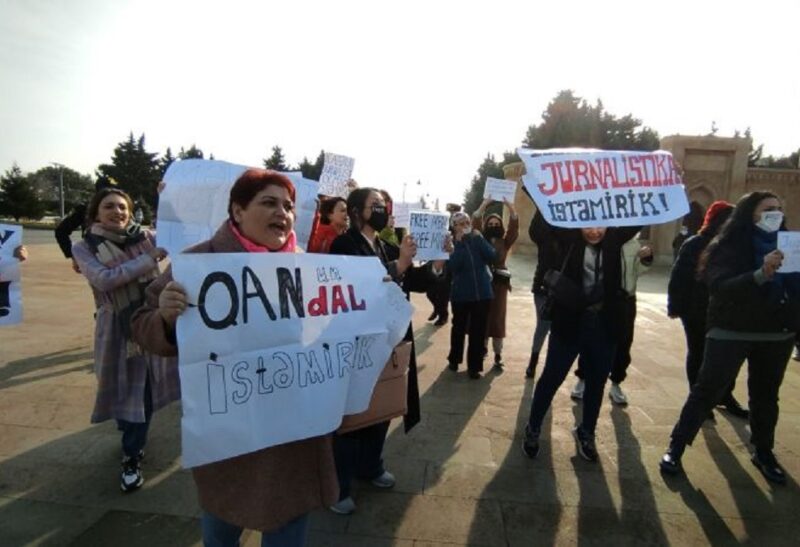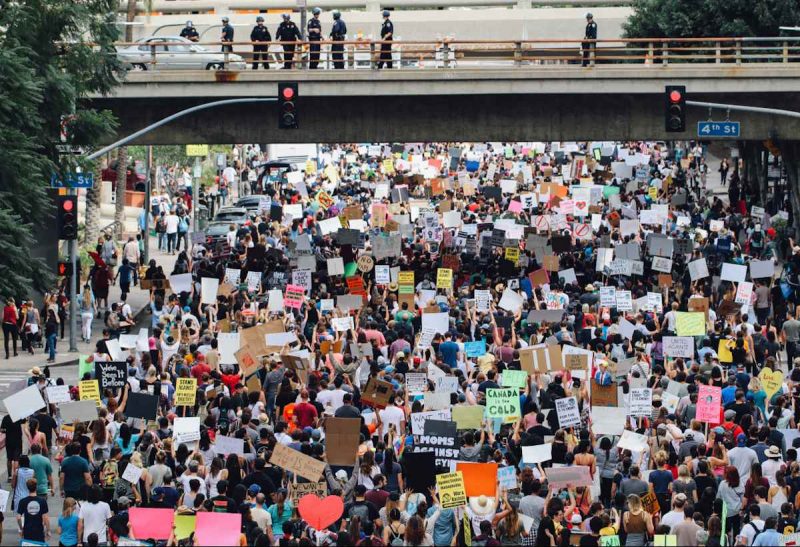From 25 November, the International Day for the Elimination of Violence against Women, to 10 December, Human Rights Day, the
16 Days of Activism against Gender-Based Violence Campaign
is a time to galvanize action to end violence against women and girls around the world. This year, the UNiTE Campaign will mark the 16 Days of Activism against Gender-Based Violence under the overarching theme, “
Leave No One Behind: End Violence against Women and Girls
”— reflecting the core principle of the transformative 2030 Agenda for Sustainable Development.
As part of the 16 Days of Activism, Meydan TV is publishing an in-depth look at human trafficking in Azerbaijan. This is the third of four parts. Part two can be read
here
.
PART III
Back into the lion’s cage

Once back in Baku, Khayala was turned over to the government of Azerbaijan. Police and government officials who work at the Main Department on Combating Human Trafficking called her an immoral woman for being a prostitute. Though she was not formally charged with prostitution as a crime, the government employees treated her as if she had been selling her body. She was laughed at and told that she should not cry because what happened to her was her fault.
Khayala’s traumatizing experience at the hands of the government illuminates the harm survivors can experience when they return to Azerbaijan.
Many survivors of human trafficking worldwide do not seek assistance at all because they fear mistreatment.
The government has full discretion over who is officially recognized as a “victim” of human trafficking and eligible for reparations and rehabilitation. “Victim” is a legal term, referring to a person who has certain legal rights because of the harm they have experienced from a criminal act. According to a
2014 report by the Council of Europe’s Group for Experts on Action against Trafficking in Human Beings (GRETA)
, NGOs expressed concern about the prevalence of negative stereotypes that hinder the official identification of victims of human trafficking, as illustrated in Khayala’s story.
In the report, GRETA urges the Azerbaijan government to implement additional training for key positions such as police officers, prosecutors and judges to increase awareness about appropriate treatment and the legal rights of victims.
But even if these key actors were adequately trained, the efficacy of the government’s anti-trafficking work would still be limited, because a large part of Azerbaijan’s population lives outside of Baku. The Main Department on Combating Human Trafficking at the Ministry of Internal Affairs is based in Baku, with no regional offices.
In addition to a lack of training, the
GRETA report
said that there should be better methods of identifying those eligible for reparation and the role various officials play. Meydan TV journalists also received conflicting information from NGO workers about the process. There appears to be widespread confusion about the government’s methods of identifying victims and the role that NGOs can play as advocates.

Khayala was initially placed in the government-run shelter, housed under the Ministry of Internal Affairs. More a detention center than a shelter, it was heavily guarded and she was not allowed to leave. She was alone, provided neither legal representation nor an advocate from an NGO. Her only interactions were with employees of the shelter and the Ministry of Internal Affairs, most of whom were male. She was uncomfortable speaking with them about her experience. They were not sympathetic when she did. They pressured her to give them information about her traffickers and graphic details of her sexual exploitation, threatening to leave her in the streets if she did not cooperate. She was not provided with medical and psychological care to help her recover from being held against her will and sexually exploited for months.
According to sources in Azerbaijan interviewed by U.S. State Department for the
2016 Trafficking in Persons Report
, attempts such as these by the government to coerce survivors into assisting with the investigation of alleged traffickers is common practice. NGO workers and human rights attorneys who work with survivors of exploitation said that
those who decline to cooperate do not receive the same quality of care as those who do cooperate, and are often banned from the shelter.
Denial of shelter and rehabilitative services is a violation of legislation passed by the Parliament of Azerbaijan. According to the
Law on Trafficking in Persons
, survivors of human trafficking are to be given 30 days in the state-run shelter regardless of whether or not they cooperate with criminal prosecution agencies or testify against their traffickers. This 30-day “reflection period” is also enshrined in international conventions of both the
United Nations
and
Council of Europe
that address trafficking in persons, which Azerbaijan has signed and ratified.
According to Director of the Women’s Crisis Center Matanat Azizova and a human rights defender who asked to remain anonymous,
Azerbaijani law enforcement and the Main Department on Combating Human Trafficking attempt to coerce information out of survivors of exploitation in order to identify the traffickers and extort money from them.
Azizova and others alleged in interviews with Meydan TV that in return for bribes, corrupt government officials promise traffickers impunity.

After refusing to provide government officials with information about her traffickers because she feared reprisal, Khayala was forced to leave the shelter. Without a job, money, or contacts in Baku, Khayala turned to prostitution to earn enough money to travel back to her hometown. Unaware of the NGO women’s shelter in Baku, she saw no alternative.
Khayala’s experience is based on information from exploitation experts such as Matanat Azizova. She said in an interview that those who do not provide information “are not allowed to stay in the shelter and must stay on the streets.” After the Women’s Crisis Center closed due to what Azizova says was a part of the government crackdown on NGOs, Clean World Public Union is the only other shelter in Baku that houses female survivors of human trafficking. Azerbaijan Children’s Union has a shelter for children, and the Azerbaijan Migration Center has one for men. While they have some awareness activities in rural Azerbaijan, limited funding and capacity confine most of these organizations’ work to Baku. The only NGO outside of Baku involved in anti-trafficking work is Temas in Ganja.
NGOs involved in rehabilitating survivors of exploitation are also restricted by their dependence on the government. Women who seek the help of NGOs before going to the police may be turned away by the government, even with an advocate present from civil society. According to the U.S. State Department
2016 Trafficking in Persons Report
, the government did not follow up on the referral of 130 potential trafficking victims. Mehriban Zeynalova, Director of Clean World Public Union, said in an interview with Meydan TV that
it is not possible to protect survivors of human trafficking without the cooperation of the government.
Another issue that plagues the NGO sector in Azerbaijan is lack of independence from the government. According to human rights defender Alovsat Aliyev,
the government of Azerbaijan either shuts down nonprofit organizations or attempts to control them.
For example, according to Aliyev and an independent human rights attorney, Mehriban Zeynalova is employed by the Main Department on Combating Human Trafficking under the Ministry of Internal Affairs in addition to her position as director of Clean World. Aliyev said that conflicts of interest such as this lead to ineffective programs as employees are stretched too thin and sometimes must prioritize the government over that of the NGO for self-preservation.
An additional barrier to preventing sexual exploitation and rehabilitating survivors is the attitude of some NGO workers and human rights defenders. They, too, can sometimes seem to be under the influence of stereotypes.
Sudaba Mammadova is the director of Temas Public Union in Ganja, one of the few remaining NGOs in Azerbaijan engaged in anti-trafficking work. During a phone interview with a Meydan TV journalist, when speaking about women who had been trafficked after voluntarily after working as prostitutes, she stated,
“Onlar bile bile gedirler.”
This translates to
“they go knowingly.”

Malnourished, exhausted and still suffering from complications from the incorrectly performed forced abortion, Khayala survived the long journey from Baku to her village. After hours in a crowded van to the bus station in the town nearest to her village, she hitchhiked the rest of the way home. She arrived at her childhood home penniless and without even a change of clothes. She cried in her mother’s arms and held her child. She told her parents she had been kidnapped and refused to see her husband. The next day, Khayala told her mother what had really happened – the beatings, the violent abortion, the endless days and nights of men forcing themselves upon her. In shock and ashamed, her mother immediately told her father. He was furious at the shame that Khayala had brought upon his family and terrified that the community would find out.
Khayala represents the women whose stories were shared with Meydan TV. Human trafficking expert Matanat Azizova described a woman who was stabbed to death by a male family member after he discovered that she had been forced into prostitution. Human rights defender Alovsat Aliyev similarly spoke of a woman who was shot upon returning home from being exploited abroad.
Both Azizova and Aliyev said that these “honor killings” – the murder of a relative who is perceived to have brought dishonor on the family – are not uncommon. However, because of underreporting, a lack of data made available by the Azerbaijani government on violence against women, and what they say is the intentional concealment of information on human trafficking, the true scope of “honor killings” in Azerbaijan is unclear.
Azizova said that, in her experience, many survivors of human trafficking who became victims of honor killings had previously been isolated in the government shelter and received no support upon returning to their communities. In a video interview with Meydan TV, she said that
by sending a woman subjected to sexual exploitation back to her home without addressing the deeply entrenched stigmatization of such women, “you put her back into the lion’s cage.”
According to the Report On Monitoring of Implementation of the Azerbaijan Republic National Action Plan to Combat Human Trafficking (2009-2013), published by the Azerbaijan Migration Center in 2013 and financed by the U.S. State Department, 100 percent of respondents to a survey answered that families of victims of human trafficking do not receive psychological support. Women identified by the government as victims of human trafficking and government employees who work with trafficking victims were surveyed. In a report based on her visit to Azerbaijan, the
OSCE Special Representative and Coordinator for Combating Trafficking in Human Beings
urged immediate action to ensure contact with the families of the victims and to prevent the women’s stigmatization upon return.
A women’s rights activist in Azerbaijan said in a video interview with Meydan TV that, in addition to facing violence or even murder, survivors of sexual exploitation or rape experience social exclusion. Many are banned by their families from going out in public because of the shame associated with prostitution and the lack of education about sexual assault. She said that this
isolation can lead to depression and, in some cases, suicide.
Survivors of human trafficking are also at risk of being trafficked again.A woman who sought help from the Women’s Crisis Center is quoted by Azizova as saying,
“Society forced me, because they called me a prostitute, they cursed at me, they insulted me and suddenly someone said kind words to me. And I was convinced. Society forced me to be a victim a second time.”



